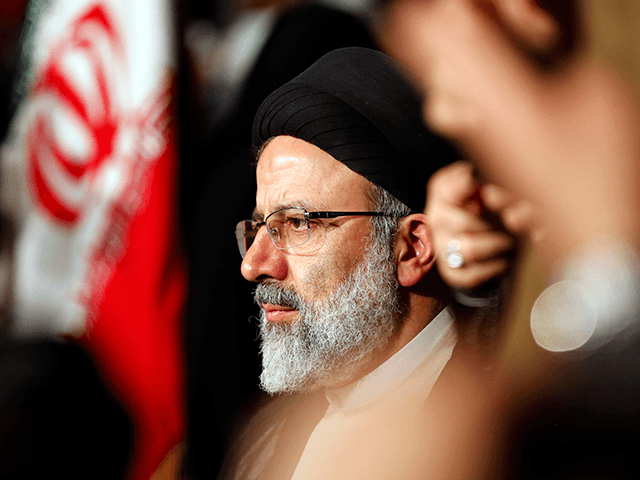Iranian Chief Justice Ebrahim Raeisi on Wednesday accused the U.S. government of helping the Islamic State recover its strength in Syria and spread its operatives into countries such as Iran that oppose U.S. hegemony.
According to Raeisi, only Iran and the Shiite-dominated government of Iraq truly stand against ISIS.
“The U.S. claimed that it seeks to fight Daesh [ISIS] and formed a coalition for this, but we have witnessed the strengthening of Daesh in terms of weapons, logistics, intelligence, and other aspects,” Raeisi said during a meeting with Iraqi President Barhan Salih in Baghdad.
“While Iraq, Syria, Iran and regional countries are working together to eliminate the remnants of Daesh, the Americans do nothing but relocate the Daesh terrorists in the region,” the head of the Iranian judiciary claimed.
In a similar vein, Raeisi portrayed Iran’s chief terror operative, Gen. Qasem Soleimani, and Iraqi terrorist militia chief Abu Mahdi al-Muhandis as “heroes of the fight against terrorism” who were “martyred” when the U.S. eliminated them with a drone strike in January 2020.
Muhandis was the founder of Kataib Hezbollah, an Iraqi Shiite militia group loyal to Iran and a designated terrorist organization. He died because Kataib Hezbollah launched a series of terrorist attacks against Iraqi bases where American personnel was stationed, killing an American contractor. Soleimani was the mastermind of innumerable terrorist attacks against American troops in Iraq and coordinated an illegal assault on the U.S. Embassy in Baghdad shortly before he was targeted.
“Daesh” is another name for the Islamic State. Raeisi and Iranian state media also referred to ISIS as a “Takfiri outfit,” a term that essentially means “false Muslims.”
Iran frequently accuses the United States of either not doing enough to fight ISIS or actively supporting it, ignoring the tremendous damage inflicted on the Islamic State under the Trump administration, including the humiliating death of ISIS commander Abu Bakr al-Baghdadi at the hands of U.S. special forces in October 2019.
In late January, a U.S. airstrike conducted with the cooperation of Iraqi security forces killed Jabbar Salman Ali Farhan al-Issawi, the top Islamic State leader in Iraq, along with nine of his fighters. Al-Issawi was described as the “deputy caliph,” or leader, of the entire Islamic State by Iraqi officials. The strike was conducted after an ISIS attack on a market in Baghdad killed 32 Iraqis.
Raeisi visited the site of the U.S. drone strike that killed Soleimani and Muhandis during his drip to Baghdad. He also met with “martyrs” of the Popular Mobilization Units (PMU), armed Shiite militia groups that were deputized to fight the Islamic State at the height of its power. Kataib Hezbollah is a member of the PMU.
“The assassination of Soleimani and Muhandis will not go unanswered,” Raeisi vowed while visiting the location of their deaths. “The resistance of Iraqis against the elements of the Great Satan America deserves to be praised.”
Influential Iraqi Shiite cleric Moqtada al-Sadr deployed his own paramilitary force, the so-called “Peace Brigade,” to the cities of Najaf, Karbala, and Baghdad this week because an alliance of ISIS terrorists and Baathists, the remnants of former Iraqi dictator Saddam Hussein’s party, is supposedly planning to attack Shiite holy sites.
Demonstrators in Najaf last Friday chanted “Moqtada is the enemy of Allah,” a slogan that spokesmen for the Shiite clerics denounced as the creation of “Baathists and Daesh members, or people imitating the West and loving the Zionist enemies.” Sadr’s forces have already conducted “raids” against organizers of the protests, and have allegedly kidnapped and tortured at least one activist.
The reason people were marching in Najaf and denouncing Sadr as an enemy of Allah is that February marks the one-year anniversary of Sadr’s goons attacking a camp full of anti-government protesters, killing at least eight people. Sadr and his “Peace Brigades” alternate between supporting demonstrations against the corrupt Iraqi government and murdering them; at the time of the February 2020 massacre, he was wholeheartedly supporting the candidacy of Prime Minister Mohammed Allawi, also backed by Iran and its Shiite proxies in Iraq.
Allawi eventually withdrew from the contest, leaving Mustafa al-Kadhimi to become prime minister. Kadhimi campaigned on reducing the influence of Iran and Shiite militia forces over Iraqi government.

COMMENTS
Please let us know if you're having issues with commenting.